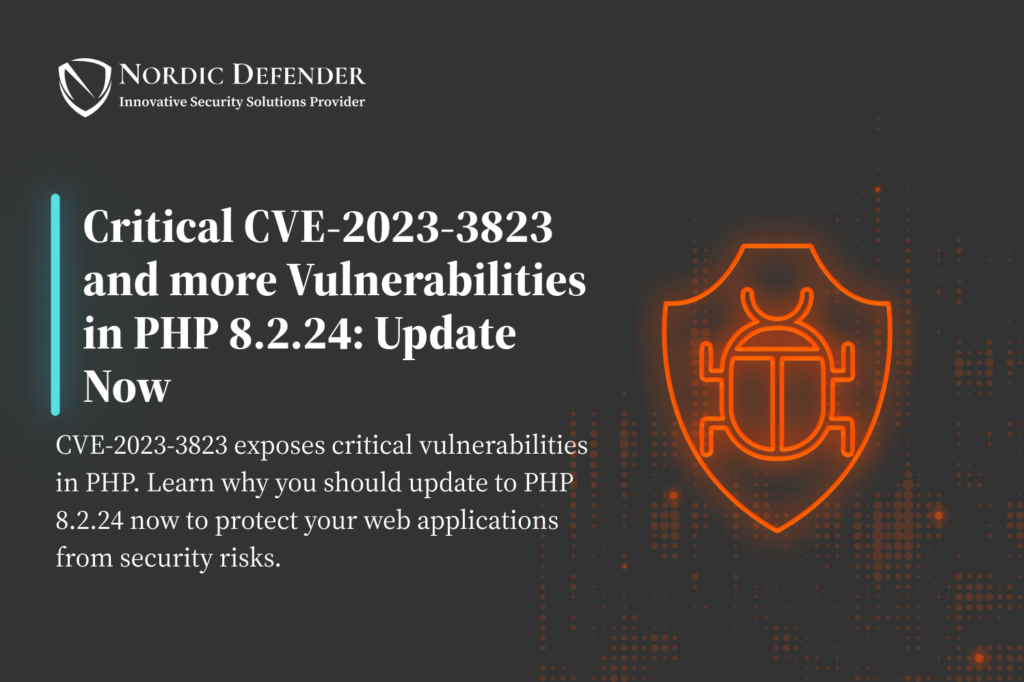The discovery of several vulnerabilities in PHP versions prior to 8.2.24 has reignited concerns about web application security. Among these vulnerabilities is CVE-2023-3823, a flaw that could lead to arbitrary code execution, potentially allowing attackers to compromise websites running outdated PHP versions.
For businesses relying on PHP-based applications, this poses a serious risk, especially if their environment uses PHP-CGI on Windows, a combination that has been specifically highlighted as vulnerable. Even though PHP remains one of the most widely used scripting languages for web development, its popularity makes it an attractive target for attackers. As a result, failing to address these vulnerabilities exposes systems to remote code execution (RCE), denial-of-service (DoS) attacks, and other serious security issues.
Why CVE-2023-3823 and Other PHP Vulnerabilities are Critical
The most pressing concern with CVE-2023-3823 is the potential for unauthorized access to sensitive data, server takeover, or even full control of the affected systems. In a worst-case scenario, attackers could use these exploits to execute code on the server, modify files, steal data, or escalate their privileges to cause more damage. Furthermore, if a compromised website is part of a larger network or shares resources, this vulnerability could become an entry point for lateral attacks.
For companies, this could translate into costly security incidents, including data breaches, financial loss, or reputational damage. The longer a system remains unpatched, the higher the risk of exploitation by opportunistic attackers leveraging automated scanning tools.
The Need for Immediate Upgrades
Organizations using PHP versions older than 8.2.24 should act immediately by upgrading their installations to the latest version. This is particularly critical for businesses that operate e-commerce platforms, content management systems (CMS), or other PHP-based applications. A proactive approach in addressing these vulnerabilities, including CVE-2023-3823, ensures that potential attackers do not exploit weak spots in your infrastructure.
In addition to upgrading PHP, organizations should consider conducting comprehensive vulnerability assessments and penetration tests to ensure there are no hidden weaknesses in their web applications. At Nordic Defender, we offer advanced vulnerability management solutions designed to identify and mitigate risks before they lead to costly incidents.
How Penetration Testing Can Help
For businesses looking to strengthen their defenses, regular penetration testing is key. Our Next-Gen, Crowd-Sourced Pentest service enables organizations to schedule customized security assessments, identifying vulnerabilities like CVE-2023-3823 and others. By simulating real-world attacks, penetration tests provide a comprehensive evaluation of your systems’ weaknesses.
Penetration tests not only identify vulnerabilities but also offer actionable remediation steps to fix them. This proactive approach helps companies stay ahead of evolving threats while ensuring that their web applications and infrastructure are resilient against cyberattacks.
Staying Secure with Regular Updates and Expert Support
Regular updates are essential for maintaining a secure environment, but it’s equally important to understand the nature of the vulnerabilities you’re defending against. CVE-2023-3823 is just one of many security risks businesses face in the complex world of web development. By staying informed and partnering with cybersecurity providers like Nordic Defender, you can protect your organization from these ever-present threats.
Our offensive and defensive cybersecurity solutions are designed to help organizations of all sizes, from SMEs to large enterprises, navigate the intricate landscape of modern threats. With real-time vulnerability scanning, targeted pentesting, and continuous monitoring, we ensure your systems stay safe and compliant.
